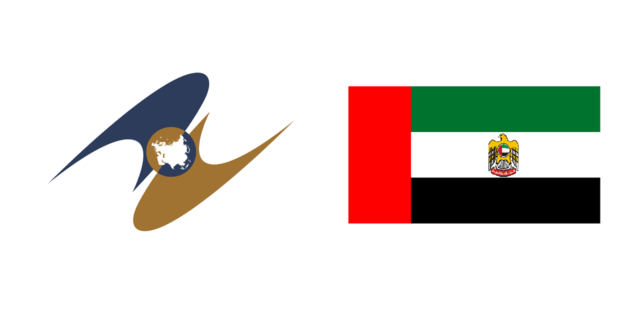The UAE deal with the Eurasian Economic Union (EAEU) is set to change the trade landscape between the Gulf and Eurasian regions. This landmark agreement will slash tariffs on a wide range of goods, giving a massive boost to bilateral trade, which has already surged by over 50% in recent years.
The agreement is more than just a trade deal; it is a strategic move that signals the UAE’s commitment to expanding its global trade partnerships and diversifying its economy beyond oil. Let’s take a closer look at how this deal came about, what it covers, and what it means for businesses, investors, and consumers.
What is the Eurasian Economic Union?
Before diving into the details, it’s important to understand what the EAEU is. Established in 2015, the Eurasian Economic Union is a regional economic bloc that includes Russia, Belarus, Kazakhstan, Armenia, and Kyrgyzstan.

The union was formed to promote the free movement of goods, services, capital, and labor among its member states, similar to the European Union. Over the years, the EAEU has become a significant economic force, with a combined GDP of over $2 trillion and a population of nearly 180 million people.
Why the UAE is partnering with the EAEU
The UAE has been actively pursuing trade diversification as part of its vision to build a sustainable and resilient economy. While oil and gas have long been the backbone of the UAE economy, leaders in Abu Dhabi and Dubai have recognized the need to strengthen other sectors such as logistics, manufacturing, technology, and food security.

Partnering with the EAEU aligns perfectly with these goals. By eliminating or reducing tariffs on a variety of products, the UAE can expand its exports to EAEU countries while also importing goods at lower costs.
For the EAEU, the UAE serves as a strategic gateway to Middle Eastern, African, and South Asian markets. Its world-class ports, advanced logistics infrastructure, and business-friendly environment make it an ideal partner for Eurasian exporters looking to expand globally.
Key highlights of the deal
Here are some of the main points covered in the new agreement:
- Tariff reductions: Significant cuts in tariffs on industrial products, agricultural goods, and raw materials.
- Customs simplification: Faster customs clearance procedures and less paperwork, saving time and money for businesses.
- Investment facilitation: Easier access for investors from both sides to set up joint ventures and establish production facilities.
- Technical cooperation: Collaboration on standards, certifications, and technology transfer.
- Logistics support: Strengthening transportation corridors and enhancing air and sea connectivity between the UAE and EAEU member states.
These points make this agreement a comprehensive economic partnership rather than just a simple trade pact.
Bilateral trade soars over 50%
One of the most striking outcomes that led to this agreement is the rapid growth in trade between the UAE and EAEU countries. Over the past five years, bilateral trade has surged by more than 50%, reaching record levels.
Some of the top products exported from the UAE to EAEU countries include electronics, machinery, aluminum, and petrochemical products. Meanwhile, the UAE imports grains, metals, machinery parts, and various food products from the EAEU.
This growth is expected to accelerate even further with tariff barriers removed, making it easier for small and medium-sized enterprises (SMEs) as well as large corporations to enter these markets.

Benefits for UAE businesses and investors
The deal offers a wide range of benefits for UAE-based businesses:
- Cost savings: Reduced tariffs mean lower export costs, making UAE products more competitive in Eurasian markets.
- Market expansion: Businesses can now tap into a massive consumer base across Russia, Kazakhstan, Belarus, Armenia, and Kyrgyzstan.
- Increased profitability: With fewer barriers and lower costs, companies can expect higher profit margins and better returns on investment.
- Diversified supply chains: Importing raw materials and components from the EAEU at lower costs will help UAE manufacturers improve efficiency and reduce dependency on other markets.
Opportunities for Eurasian exporters
On the other side, Eurasian businesses will also gain significant advantages:
- New market access: The UAE is a thriving hub for re-export, offering access to the Middle East, Africa, and South Asia.
- Boost in agricultural exports: Countries like Russia and Kazakhstan can increase their exports of grains, meat, and dairy products to the UAE.
- Industrial cooperation: Eurasian manufacturers can collaborate with UAE firms to produce and distribute goods tailored to regional demand.
- Investment attraction: With better market access, Eurasian investors may be more inclined to establish offices or production units in the UAE’s free zones.
Consumer impact: More choices at better prices
The agreement is not just good news for businesses; it also benefits consumers. Lower import tariffs mean that many products — especially food items and industrial goods — could become more affordable in UAE supermarkets and retail stores.
Increased availability of goods will also lead to more choices for consumers, promoting a more competitive market environment and encouraging higher quality standards.
Strengthening diplomatic and cultural ties
While the economic advantages are clear, this agreement also deepens diplomatic and cultural ties between the UAE and EAEU member states.
The UAE has always maintained an open-door policy for foreign investors and cultures, and this partnership reinforces its image as a global connector. Cultural exchanges, tourism, and people-to-people ties are expected to grow as a result of increased business and trade activities.
Challenges and considerations
Despite the many benefits, there are challenges to consider. The EAEU markets have their own regulatory frameworks and business environments, which can be complex and sometimes unpredictable.
Companies must be prepared to navigate local laws, customs regulations, and certification processes. Similarly, Eurasian exporters entering the UAE must comply with local standards, including halal requirements for food products.
Logistical challenges such as language barriers, currency fluctuations, and political dynamics also require careful planning and risk assessment.
UAE’s broader trade strategy
This agreement is part of a larger economic strategy known as the “We the UAE 2031” vision, which aims to double the national economy and position the country among the top global economies in the next decade.
As part of this strategy, the UAE has been actively pursuing comprehensive economic partnership agreements (CEPAs) with several countries and economic blocs, including India, Israel, Indonesia, and now the EAEU.
These agreements help the UAE diversify its economic partners, reduce its reliance on oil revenues, and secure strategic access to key markets.

How businesses can prepare
Businesses in the UAE and EAEU looking to benefit from this agreement should consider the following steps:
- Market research: Understand market demand, consumer preferences, and competitive landscapes in target countries.
- Compliance readiness: Familiarize themselves with new customs procedures, standards, and certification requirements.
- Partnership building: Explore joint ventures, distribution partnerships, or franchise models to enter new markets effectively.
- Supply chain adaptation: Identify potential suppliers and logistics partners to ensure a smooth flow of goods.
- Brand positioning: Adapt marketing and branding strategies to resonate with local audiences.
Future prospects
Looking ahead, the UAE deal with the Eurasian Economic Union is likely to set the stage for even deeper economic cooperation. Possible future steps could include:
- Creating special economic zones dedicated to joint UAE-EAEU ventures.
- Launching innovation hubs for technology exchange and research and development.
- Developing joint infrastructure projects, such as ports and transport corridors.
- Establishing cross-border e-commerce platforms to facilitate digital trade.
These initiatives could further strengthen ties and create a dynamic, resilient trade ecosystem that benefits both sides.
Final thoughts
The UAE deal with the Eurasian Economic Union is a game-changer that will reshape trade and investment dynamics between these two important regions. With tariff barriers coming down, trade volume soaring, and new partnerships forming, this agreement offers significant opportunities for businesses, investors, and consumers alike.
As the UAE continues to position itself as a global trade and investment hub, this landmark deal illustrates the country’s forward-thinking approach and commitment to economic diversification.
Businesses that act early and strategically stand to gain the most from this new era of cooperation and growth.
Follow us on Instagram: UAE STORIES
Read More: UAE Brazil investment deal: UAE signs $100bn BRICS agreement












